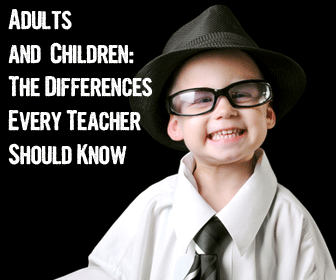Teaching English as a second language can often be an exciting career for many.
The Differences Between Adults & Children You Should Know
-
1
Children and Learning
One of the first things you should remember about kids is that their brains have more elasticity than those of adults. You could say that their brains are not “formed” yet, so to speak. As a result, it is easier for children to learn a new language. Try to remember your own personal experience, if you know a foreign language. If you learned it at the age of 7-10, learning new words most likely came easier to you, and you probably found yourself understanding simple phrases quite easily. However, as we become older, taking on a new language becomes a lot more difficult.
-
2
Games, Story-Telling and More
It is also important to include age appropriate materials in your classes. For example, children are not going to be interested in reading articles about the state of the economy, or even the fashion industry. In fact, most kids generally won’t like reading articles at all! Other techniques need to be employed.
Games: Both adults and children love games. Therefore it is important to include these as much as possible in the class. In doing this, the teacher will be able to let words sink in easier. Often they can include games such as Hang Man, Pictionary, Simon Says and much more.
Story Telling: This is another effective technique. All children love story time. Find a simple fairy tale to tell the children, or make one up yourself! Afterwards, ask questions by putting the characters in different situations (“Sally’s grandmother is ill, what should Sally do?”). This way, kids can come up with their own answers. Effectively, you will be able to get the children to write their own stories. This can be incredibly beneficial in terms of their production skills.
Attention Spans: Children also tend to have short attention spans, so it is important for you to realize this. Long, drawn-out exercises which involve a lot of silence will not work. The kids will become agitated, start fidgeting and lose interest. Keep them engaged at all times. Posing questions, getting everyone involved in the exercise, and generally keeping them on their toes is always a good idea and can prove very effective.
-
3
Adults and Learning
For older people, learning a language can be a challenge. There are some who do this professionally for translator jobs, and will generally have a gift for this. But for many adult learners, this is going to be new territory. Specifically when it comes to learning English, many might have had previous instruction in school as children. This is particularly true of those who live in Western European countries.
-
4
Topics of Interest, Humour and Activities
Keeping adults engaged is just as important as doing so with children! You might find that there are some students who are intent on learning, and will do their best to concentrate. This may not always be the case, therefore it is important to keep the class as interesting as possible.
Activities: Games are possible option for adults as well. A lot of the time, they might have be tailored to suit adults. More “grown up” type games and activities will be useful in this regard. Debates are often a great way to get adults talking. Often, the students will end up speaking more and arguments can break out. As long as it does not get out of hand, this can be incredibly positive. The less you have to do, the more of a success the class is!
Humour: It is also a good idea to have a sense of humour. Just be aware how humour translates in different cultures. In Germany, for example, the people are notorious for being humourless. This isn’t necessarily the case, as it can differ from one region to the next.
Topics of Interest: If you are teaching business people, then topics related to what they are doing (for example, someone who works with pressured air) will probably spark up the students’ interests a bit more. The Internet is a wonderful resource in this sense, and you can find information on almost anything with the click of a mouse. Remember, most adults will also like to take a logical approach, but overall with both children and older students, using the language in a practical way is the most beneficial method.
P.S. If you enjoyed this article, please help spread it by clicking one of those sharing buttons below. And if you are interested in more, you should follow our Facebook page where we share more about creative, non-boring ways to teach English.








